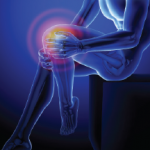NEW YORK (Reuters Health)—Patients undergoing total joint replacement are younger now than they were in 2000, new research indicates. The average patient undergoing a total hip replacement (THR) in 2014 was 64.9 years, while the average patient in 2000 was 66.3 years. Similarly, the average patient undergoing a total knee replacement (TKR) was 65.9 in…
Search results for: knee
Blacks in U.S. Lose Quality of Life Due to Fewer Knee Replacements
(Reuters Health)—Black people with knee osteoarthritis may have a worse quality of life than white patients in part because they’re less likely to be offered knee replacement surgery or to get the procedure when it’s recommended, a U.S. study suggests. Knee replacement surgery has the potential to greatly relieve suffering from severe joint pain that…
Rheumatology Coding Corner Answer: Bilateral Knee Injections
Take the challenge. CPT codes: 20611-LT, 20611-RT, J7326x2 or 20611, 20611-50, J7326x2 ICD-10: M17.0 Coding Rationale The CPT code 20611 is for an arthrocentesis, aspiration and/or injection, major joint or bursa (e.g., shoulder, hip, knee or subacromial bursa with ultrasound guidance, with permanent recording and reporting). The code is billed twice because this was a…

Rheumatology Coding Corner Question: Bilateral Knee Injections
A 68-year-old male patient returns to the office for his scheduled bilateral knee injections for primary osteoarthritis. The patient rates the pain in his right knee at an 8 on a scale of 10, and the pain in his left knee at a 7. He was in the office a week before, but the practice…

Does MRI Differentiate Osteoarthritis and Meniscal Tear in Knee Pain?
When a young patient arrives at a clinic complaining of knee pain with clicking or popping, a meniscal tear is often the culprit. “In young [people], there’s a pretty classic presentation of meniscal tear, with clicking and other mechanical symptoms, because the tear rubs up against different tissues,” says Jeffrey Katz, MD, MSc, a rheumatologist…
Knee Surgery Outcomes Linked with Education Level
(Reuters Health)—Patients who live in low-income communities and lack a college education may have worse pain after knee replacement surgery than their more educated neighbors, a recent study suggests. Two years after total knee replacement surgeries, patients in poor communities who hadn’t gone to college had average pain scores that were about 10 points worse…
Varus Thrust Is Associated with Progressive Knee OA
To determine if varus thrust, a bowing out of the knee during gait (i.e., the first appearance or worsening of varus alignment during stance), is associated with incident and progressive knee osteoarthritis (OA), these researchers undertook an Osteoarthritis Initiative ancillary study. They also considered hypothesized associations adjusted for static alignment, anticipating some attenuation. Methods: Gait…
Do Older Women Who Use Bisphosphonates Need Fewer Knee Replacements?
NEW YORK (Reuters Health)—The rate of knee replacement surgery among older women with knee osteoarthritis is lower in those who take bisphosphonates than in those who don’t, according to a database study. Knee osteoarthritis accounts for 97% of all knee replacement surgeries. Trials of bisphosphonates in knee osteoarthritis have yielded conflicting results. To learn more,…
Flexion’s Knee Pain Drug Gets FDA Approval
(Reuters)—Flexion Therapeutics Inc. said its injectable drug to treat osteoarthritis-related knee pain was approved by the U.S. Food and Drug Administration. The approval comes at a time when U.S. federal authorities are implementing a slew of measures to combat opioid abuse, with President Donald Trump in August declaring the opioid epidemic a national emergency. The…

Acupuncture & Electrotherapy May Help Patients after Total Knee Arthroplasty
A new review examined how drug-free interventions affect pain relief and analgesic consumption for patients who have had knee surgery. Although little evidence shows these treatments reduce actual pain, electrotherapy and acupuncture may help patients delay their postoperative use of opioids…
- « Previous Page
- 1
- …
- 3
- 4
- 5
- 6
- 7
- …
- 80
- Next Page »